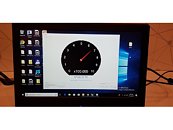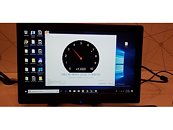Raevenlord
News Editor
- Joined
- Aug 12, 2016
- Messages
- 3,755 (1.16/day)
- Location
- Portugal
| System Name | The Ryzening |
|---|---|
| Processor | AMD Ryzen 9 5900X |
| Motherboard | MSI X570 MAG TOMAHAWK |
| Cooling | Lian Li Galahad 360mm AIO |
| Memory | 32 GB G.Skill Trident Z F4-3733 (4x 8 GB) |
| Video Card(s) | Gigabyte RTX 3070 Ti |
| Storage | Boot: Transcend MTE220S 2TB, Kintson A2000 1TB, Seagate Firewolf Pro 14 TB |
| Display(s) | Acer Nitro VG270UP (1440p 144 Hz IPS) |
| Case | Lian Li O11DX Dynamic White |
| Audio Device(s) | iFi Audio Zen DAC |
| Power Supply | Seasonic Focus+ 750 W |
| Mouse | Cooler Master Masterkeys Lite L |
| Keyboard | Cooler Master Masterkeys Lite L |
| Software | Windows 10 x64 |
QLC is the next big step in flash memory, with another bump in density increases and, crucially for consumers, revised, lower pricing for flash-based products that employ the new technology. We've already had a sneak peek at what QLC-based products can deliver - Intel's leaked SSD 660P employs QLC memory and is expected to deliver 1,800 MB/s in sequential read and up to 1,200 MB/s in sequential write speeds with 150,000 IOPS. Expect base drive capacities to increase - QLC being higher density would mean fewer NAND chips, but manufacturers want to keep the added performance of chip parallelism.
However, flash needs controllers to deliver its true potential, and Marvell has one up its sleeve. The new controller will eventually replace the NVMe 1.1 Eldora (88SS1093) used in some popular SSDs that are already shipping, such as Plextor's M9Pe, and the folks at Tom's hardware took a peek at it - running the current TLC memory, that is. The controller delivered over 670,000 IOPS and 3,500 MB/s in the demo, though there's no information on the density of the drive. But for those performance levels, it must've had a good amount of silicon. While not representative of final QLC memory performance of the controller, it's good to know that at least this part of the ecosystem is good to go. Now if only QLC was quick and hot off the presses, we could see a $100 512 GB SSD.


View at TechPowerUp Main Site
However, flash needs controllers to deliver its true potential, and Marvell has one up its sleeve. The new controller will eventually replace the NVMe 1.1 Eldora (88SS1093) used in some popular SSDs that are already shipping, such as Plextor's M9Pe, and the folks at Tom's hardware took a peek at it - running the current TLC memory, that is. The controller delivered over 670,000 IOPS and 3,500 MB/s in the demo, though there's no information on the density of the drive. But for those performance levels, it must've had a good amount of silicon. While not representative of final QLC memory performance of the controller, it's good to know that at least this part of the ecosystem is good to go. Now if only QLC was quick and hot off the presses, we could see a $100 512 GB SSD.


View at TechPowerUp Main Site



